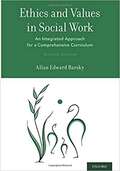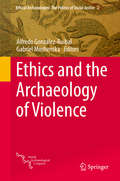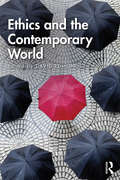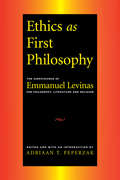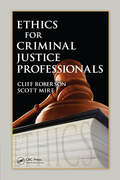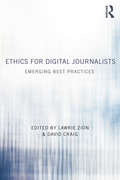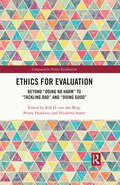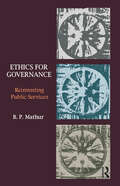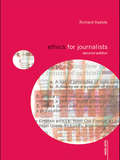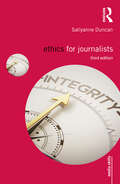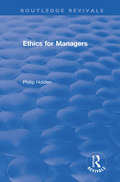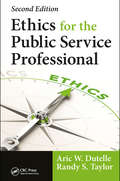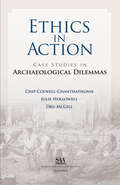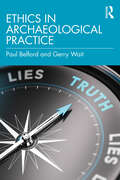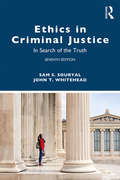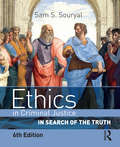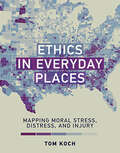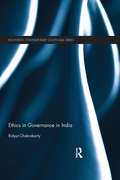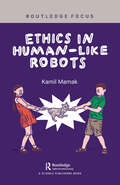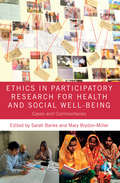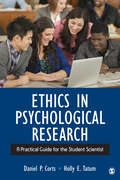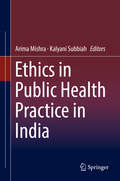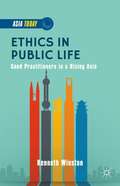- Table View
- List View
Ethics and Values in Social Work: An Integrated Approach for a Comprehensive Curriculum
by Allan Edward BarskySocial work ethics provide practitioners with guidance on how to promote social work values such as respect, social justice, human relationships, service, competence, and integrity. Students entering the profession need to develop a real-world understanding of how to apply these values in practice while also managing the dilemmas that arise when social workers, clients, and others encounter conflicting values and ethical obligations. <p><p>Ethics and Values in Social Work offers a comprehensive set of teaching and learning materials to help students develop the knowledge, self-awareness, and critical thinking skills required to handle values and ethical issues in all levels of practice--individual, family, group, organization, community, and social policy. BSW and MSW students will particularly appreciate how complex ethical obligations and theories have been translated into plain language. Additionally, the comprehensive set of case examples and exercises provides realistic scenarios to develop critical thinking and problem solving skills across a range of practice situations.
Ethics and the Archaeology of Violence
by Gabriel Moshenska Alfredo González-RuibalThis volume examines the distinctive and highly problematic ethical questions surrounding conflict archaeology. By bringing together sophisticated analyses and pertinent case studies from around the world it aims to address the problems facing archaeologists working in areas of violent conflict, past and present. Of all the contentious issues within archaeology and heritage, the study of conflict and work within conflict zones are undoubtedly the most highly charged and hotly debated, both within and outside the discipline. Ranging across the conflict zones of the world past and present, this book attempts to raise the level of these often fractious debates by locating them within ethical frameworks. The issues and debates in this book range across a range of ethical models, including deontological, teleological and virtue ethics. The chapters address real-world ethical conundrums that confront archaeologists in a diversity of countries, including Israel/Palestine, Iran, Uruguay, Argentina, Rwanda, Germany and Spain. They all have in common recent, traumatic experiences of war and dictatorship. The chapters provide carefully argued, thought-provoking analyses and examples that will be of real practical use to archaeologists in formulating and addressing ethical dilemmas in a confident and constructive manner.
Ethics and the Contemporary World
by David EdmondsArguments about ethics often centre on traditional questions of, for instance, euthanasia and abortion. Whilst these questions are still in the foreground, recent years have seen an explosion of new moral problems. Moral and political clashes are now as likely to be about sexuality and gender and the status of refugees, immigrants and borders, or the ethics of social media, safe spaces, disability and robo-ethics. How should we approach these debates? What are the issues at stake? What are the most persuasive arguments? Edited by best-selling philosophy author David Edmonds, Ethics and the Contemporary World assembles a star-studded line-up of philosophers to explore twenty-five of the most important ethical problems confronting us today. They engage with moral problems in race and gender, the environment, war and international relations, global poverty, ethics and social media, democracy, rights and moral status, and science and technology. Whether you want to learn more about the ethics of poverty, food, extremism, or artificial intelligence and enhancement, this book will help you understand the issues, sharpen your perspective and, hopefully, make up your own mind.
Ethics as First Philosophy: The Significance of Emmanuel Levinas for Philosophy, Literature and Religion
by Adriaan T. PeperzakIn Ethics as First Philosophy, Adrian P. Peperzak brings together a wide range of essays by leading international scholars to discuss the work of the 20th century French philosopher, Emmanuel Levinas. The first book of its kind, this collection explores the significance of Levinas' texts for the study of philosophy, psychology and religion. Offering a complete account of the most recent research on Levinas, Ethics as First Philosophy is an extraordinary overview of the various approaches which have been adopted in interpreting the work of a revolutionary but difficult contemporary thinker.
Ethics for Criminal Justice Professionals
by Cliff Roberson Scott MireIncreasing concerns about the accountability of criminal justice professionals at all levels has placed a heightened focus on the behavior of those who work in the system. Judges, attorneys, police, and prison employees are all under increased scrutiny from the public and the media. Ethics for Criminal Justice Professionals examines the myriad of e
Ethics for Digital Journalists: Emerging Best Practices
by David Craig Lawrie ZionThe rapid growth of online media has led to new complications in journalism ethics and practice. While traditional ethical principles may not fundamentally change when information is disseminated online, applying them across platforms has become more challenging as new kinds of interactions develop between journalists and audiences. In Ethics for Digital Journalists, Lawrie Zion and David Craig draw together the international expertise and experience of journalists and scholars who have all been part of the process of shaping best practices in digital journalism. Drawing on contemporary events and controversies like the Boston Marathon bombing and the Arab Spring, the authors examine emerging best practices in everything from transparency and verification to aggregation, collaboration, live blogging, tweeting and the challenges of digital narratives. At a time when questions of ethics and practice are challenged and subject to intense debate, this book is designed to provide students and practitioners with the insights and skills to realize their potential as professionals.
Ethics for Evaluation: Beyond “doing no harm” to “tackling bad” and “doing good” (Comparative Policy Evaluation)
by Penny Hawkins Rob D. van den Berg Nicoletta StameIn Ethics for Evaluation the diverse perspectives on ethical guidance in evaluation are untangled and ordered in a theoretical framework focusing on evaluations doing no harm, tackling bad and doing good. Divided into four parts a diverse group of subject experts present a practical look at ethics, utilizing practical experience to analyze how ethics have been applied in evaluations and how new approaches can shape the future of ethics. The chapters collectively create a common understanding of the potential role of ethics to infuse policy decisions and stakeholder initiatives with evaluations that provide better insight and potential solutions for problems, going beyond "what works" to what needs to be done and what would help. The methodological scope ranges from working in contexts of fragility, conflict and violence, to participatory and decolonized approaches, including the ethical imperatives posed by global crises such as climate change, inequity and exploitative international relations. Ethics for Evaluation presents evaluators, commissioners of evaluation, policymakers and practitioners with inspiration for an ethical perspective on how evaluation can contribute towards solving problems. It presents a solid foundation for inclusive terminology and ethics guidance that would be the heart of a global exercise in professionalization of ethical evaluation practice.
Ethics for Governance: Reinventing Public Services
by B. P. MathurThis book provides a comprehensive overview of India’s public services and bureaucratic systems, and explores why widespread corruption and inefficient delivery have slowed development. It: discusses the underlying reasons for the prevailing inefficiency in public services; examines the complex linkages between ethics-based public service, India’s cultural and spiritual heritage, and its current economic development model; and outlines ways to create an ethics code and an environment that is conducive to better administration and good governance. Lucid, accessible, and meticulously researched, this will prove essential to scholars and students of public administration, governance studies and political science, particularly bureaucrats, policy-makers and civil service aspirants.
Ethics for Journalists (Media Skills)
by Richard KeebleEthics for Journalists tackles many of the issues which journalists face in their everyday lives – from the media's supposed obsession with sex, sleaze and sensationalism, to issues of regulation and censorship. Its accessible style and question and answer approach highlights the relevance of ethical issues for everyone involved in journalism, both trainees and professionals, whether working in print, broadcast or new media. Ethics for Journalists provides a comprehensive overview of ethical dilemmas and features interviews with a number of journalists, including the celebrated investigative reporter Phillip Knightley. Presenting a range of imaginative strategies for improving media standards and supported by a thorough bibliography and a wide ranging list of websites, Ethics for Journalists, second edition, considers many problematic subjects including: representations of gender, race, sexual orientation, disability, mental health and suicide ethics online – ‘citizen journalism’ and its challenges to ‘professionalism’ controversial calls for a privacy law to restrain the power of the press journalistic techniques such as sourcing the news, doorstepping, deathknocks and the use of subterfuge the handling of confidential sources and the dilemmas of war and peace reporting.
Ethics for Journalists (Media Skills)
by Richard KeebleEthics for Journalists critically explores many of the dilemmas that journalists face in their work and supports journalists in good ethical decision-making. From building trust, to combatting disinformation, to minimizing harm to vulnerable people through responsible suicide reporting, this book provides substantial analysis of key contemporary ethical debates and offers guidance on how to address them. Revised and updated throughout, this third edition covers: the influence of press freedom and misinformation on trust; the novel ethical challenges presented by social media; the need for diversity of sources and in the newsroom, specifically relating to gender, ethnicity, sexual orientation and disability; issues around vulnerable people—reporting traumatic events, bereaved people, suicide and privacy; health journalism and reporting a pandemic; and the impact of regulation on professional standards. Taking an accessible and engaging approach, including expert reflections on personal and professional experience, Ethics for Journalists provides a wealth of insight for those in journalism, from students and trainees to specialist correspondents and experienced editors.
Ethics for Managers (Routledge Revivals)
by Philip HoldenThis title was first published in 2000: This text examines the relationship between ethics and business, looking in detail at key areas like personal standards, leadership, marketing, empowerment and the implications of "going green". Practical guidance is offered based largely on what successful organizations are already doing. Drawing on sources ranging from classic philosophy to modern managment expertise, Philip Holden shows how meeting the needs of employees, customers and the community, together with respect for the environment, can lead to improved business performance.
Ethics for Managers (Routledge Revivals)
by Philip HoldenThis title was first published in 2000: This text examines the relationship between ethics and business, looking in detail at key areas like personal standards, leadership, marketing, empowerment and the implications of "going green". Practical guidance is offered based largely on what successful organizations are already doing. Drawing on sources ranging from classic philosophy to modern managment expertise, Philip Holden shows how meeting the needs of employees, customers and the community, together with respect for the environment, can lead to improved business performance.
Ethics for the Public Service Professional
by Aric W. Dutelle Randy S. TaylorHeadlines of public service corruption scandals are painful reminders of the need for continuing education in the subjects of ethics and integrity. Public service professionals employed as government officials, forensic scientists, investigators, first responders, and those within the legal and justice systems, face daily decisions that can mean the difference between life or death and freedom or imprisonment. Sometimes, such decisions can present ethical dilemmas even to the most seasoned of professionals. Building on the success of the first edition, Ethics for the Public Service Professional, Second Edition serves as a single-source resource for the topic of ethics and ethical decision making as it relates to government service. While incorporating an examination of the history of ethics, codes and legislation, the book exposes the reader to the challenges faced by today’s public service professionals and administrators in incorporating ethics within daily decisions, procedures, and duties. Key features include: Current controversies in police, forensic, and other public service sectors including: racial profiling, evidence tampering, disaster response, and audits Important new mechanisms of accountability, including use-of-force reporting, citizen complaint procedures, and open government Contemporary news stories throughout the book introduce the reader to a broad range of ethical issues facing leaders within the public service workplace Chapter pedagogy including key terms, learning objectives, end-of-chapter questions, a variety of boxed ethical case examples, and references Ripped from the Headlines current event examples demonstrate actual scenarios involving the issues discussed within each chapter This in-depth text will be essential for the foundational development and explanation of protocols used within a successful organization. As such, Ethics for the Public Service Professional, Second Edition will help introduce ethics and ethical decision-making to both those new to the realm of forensic science, criminal justice, and emergency services and those already working in the field.
Ethics in Action: Case Studies in Archaeological Dilemmas
by Chip Colwell-Chanthaphonh Julie Hollowell Dru McGillBased on the Society for American Archaeology’s Annual Ethics Bowl, this SAA Press book is centered on a series of hypothetical case studies that challenge the reader to think through the complexities of archaeological ethics. The volume will benefit undergraduate and graduate students who can either use these cases as a classroom activity or as preparation for the Ethics Bowl, as well as those who are seeking to better understand the ethical predicaments that face the discipline.
Ethics in Archaeological Practice
by Paul Belford Gerry WaitEthics in Archaeological Practice focuses on the ethics of archaeological work in a European context.This book covers all aspects of the archaeological profession, including archaeological advisors employed by state national, or regional heritage agencies, commercial archaeologists (consultants and contractors), and academics. It considers all archaeologists as professionals and situates ethical practice at the heart of what it means to be a professional archaeologist. It works as a practical handbook organised around the main areas of activity that archaeologists undertake allowing the book to be used as a reference work when required.Ethics in Archaeological Practice will appeal to professional archaeologists, academics and students, as well as those involved in professional training.
Ethics in Criminal Justice: In Search of the Truth
by John T. Whitehead Sam S. SouryalIntroducing the fundamentals of ethical theory, Ethics in Criminal Justice: The Search for Truth, 7th Edition, exposes the reader to the ways and means of making moral judgments by exploring the teachings of the great philosophers, sources of criminal justice ethics, and ethical issues in the criminal justice system. It is presented from two perspectives: a thematic perspective that addresses ethical principles common to all components of the discipline, and an area-specific perspective that addresses the state of ethics in criminal justice in the fields of policing, corrections, and probation and parole. The seventh edition features discussion of current critical issues in criminal justice: accusations of racism, police shootings, stop-and-frisk policy, marijuana laws, mass incarceration, life sentences, prison privatization, the swift and certain deterrence model of probation, excessive probation fees, and the good lives model in corrections. The seventh edition also offers completely revised coverage of capital punishment and the rehabilitation debate and a discussion of how juvenile justice often fails to live up to its ideals. Finally, the book features new case studies of recent ethical dilemmas in criminal justice to enhance students’ understanding of real-life ethics decision making. Suitable for advanced undergraduates or graduate students in Criminal Justice programs in the US and globally, this text offers a classical view of ethical decision making and is well-grounded in specific case examples.
Ethics in Criminal Justice: In Search of the Truth
by Sam S. SouryalIntroducing the fundamentals of ethical theory, this text exposes the reader to the ways and means of making moral judgments by covering the teachings of the great philosophers, sources of criminal justice ethics and unethical patterns in the criminal justice system. It is presented from two perspectives: a thematic perspective that addresses ethical principles common to all components of the discipline, and an area-specific perspective that addresses the state of ethics in criminal justice in the fields of policing, corrections, and probation and parole. The fourth edition features expanded discussion of the formula of ethical discretion to enhance students' understanding of ethics decision making in real-life situations, as well as a new chapter on the ethics of loyalty and loyalties in the workplace.
Ethics in Everyday Places: Mapping Moral Stress, Distress, and Injury (Basic Bioethics)
by Tom KochAn exploration of moral stress, distress, and injuries inherent in modern society through the maps that pervade academic and public communications worlds.In Ethics in Everyday Places, ethicist and geographer Tom Koch considers what happens when, as he puts it, “you do everything right but know you've done something wrong." The resulting moral stress and injury, he argues, are pervasive in modern Western society. Koch makes his argument "from the ground up," from the perspective of average persons, and through a revealing series of maps in which issues of ethics and morality are embedded.The book begins with a general grounding in both moral stress and mapping as a means of investigation. The author then examines the ethical dilemmas of mapmakers and others in the popular media and the sciences, including graphic artists, journalists, researchers, and social scientists. Koch expands from the particular to the general, from mapmaker and journalist to the readers of maps and news. He explores the moral stress and injury in educational funding, poverty, and income inequality ("Why aren't we angry that one in eight fellow citizens lives in federally certified poverty?"), transportation modeling (seen in the iconic map of the London transit system and the hidden realities of exclusion), and U.S. graft organ transplantation.This uniquely interdisciplinary work rewrites our understanding of the nature of moral stress, distress and injury, and ethics in modern life. Written accessibly and engagingly, it transforms how we think of ethics—personal and professional—amid the often conflicting moral injunctions across modern society.Copublished with Esri Press
Ethics in Governance in India (Routledge Contemporary South Asia Series)
by Bidyut ChakrabartyGovernance and ethics are intertwined. A government functions within certain broad moral and ethical parameters, integrally linked with the sociological foundation of the polity in which it is articulated. The importance of ethics in governance has acquired a significant place in contemporary theoretical discussion. This book situates ethics in governance in India in the national frame and incorporates the context of globalization, allowing for the increasing importance of non-state global actors in national decision making. The author argues that a lack of ethics quickly turns into corruption and leads to governmental efforts to deal with it. He proposes that ethics are a set of standards that a society places on itself to articulate its responses to societal needs, and discusses the efforts of the Indian government at eradicating corruption and its failure. A theoretical approach to the issues of ethics in governance and corruption, this book is of interest to academics in the fields of Asian Politics, in particular Indian politics, and political philosophy.
Ethics in Human-like Robots
by Kamil MamakThe idea of creating artificial humans can be found at the beginning of the human culture. Ancient myths contain the stories of artificial humans brought to life by gods. The word robot originates from a play that was about artificial humans made from artificial flesh that aims to serve real humans. With advancements in robotics, the materialization of this idea is more real than ever before. We are witnessing attempts to create humanoid robots that might be deployed in many spheres of our life - policing, healthcare, and even for love and sex.The book focuses on the ethical issues of human likeness of robots and human tendency to anthropomorphize. It is built on the assumption that design choices are not neutral, and they need to be discussed to align robots with human values. With robots operating in the physical world, they bring ideas and risks that should be addressed before widespread deployment. The book reviews specific issues and provides suggestions and recommendations for improving robots to serve humans better. It draws on literature from Human-Robot Interactions, ethics of AI and robotics, and the philosophy of technology.
Ethics in Participatory Research for Health and Social Well-Being: Cases and Commentaries
by Mary Brydon-Miller Sarah BanksParticipatory research is well-established as an approach involving people with a direct interest in, or experience of, the issue being studied in carrying out research. However, it raises unique and challenging ethical issues. Traditional concerns with respect for the rights to confidentiality, consent, privacy and protection of ‘research informants’ do not translate easily into participatory research. Boundaries between researchers and those researched are often blurred; research trajectories may be emergent and unpredictable; and major ethical issues revolve around partnership, power, equality and respect for diverse knowledges. The book introduces the key ethical issues in participatory research, drawing on ethical theory and relevant literature before presenting seven substantive chapters, each on a different theme, such as power, ownership, confidentiality and boundaries. The chapters feature an introductory overview of the topic with reference to the literature, followed by four real-life case examples written by participatory researchers and short commentaries on each case. Drawn from around the world (from Denmark to Tanzania), the cases illustrate a range of ethical issues, outlining how they were handled and the reflections and feelings of the contributors. Focusing on developing ethical awareness, confidence and courage to act in ethically challenging situations in everyday research practice, this book is an invaluable resource for all participatory researchers.
Ethics in Psychological Research: A Practical Guide for the Student Scientist
by Daniel Paul Corts Holly E. TatumEthics in Psychological Research is a brief, practical guide for student researchers and their mentors to answer ethical questions and navigate issues of institutional policies and academic freedom. Authors Daniel P. Corts and Holly E. Tatum guide readers in identifying, preventing, mitigating, and resolving ethical issues in research using a unique ethical framework. Each of the standalone chapters provide real-life examples of ethical questions, a description of scholarly work on the matter, and suggestions for how to address similar problems should they arise in the researcher’s own work. The book makes for a succinct and easy-to-use reference for any student conducting research in the behavioral sciences.
Ethics in Psychological Research: A Practical Guide for the Student Scientist
by Daniel Paul Corts Holly E. TatumEthics in Psychological Research is a brief, practical guide for student researchers and their mentors to answer ethical questions and navigate issues of institutional policies and academic freedom. Authors Daniel P. Corts and Holly E. Tatum guide readers in identifying, preventing, mitigating, and resolving ethical issues in research using a unique ethical framework. Each of the standalone chapters provide real-life examples of ethical questions, a description of scholarly work on the matter, and suggestions for how to address similar problems should they arise in the researcher’s own work. The book makes for a succinct and easy-to-use reference for any student conducting research in the behavioral sciences.
Ethics in Public Health Practice in India
by Arima Mishra Kalyani SubbiahThis edited volume draws on ten original contributions that locate ethics at the centre-stage of public health practice. The essays explicate ethical issues, challenges, deliberations and resolutions covering a broad canvas of public health practice including policies, programmes, research, training and advocacy. The contributors are academics and practitioners in varying roles and long-standing engagement with public health in diverse settings within India. Their expertise in disciplines range from anthropology, sociology, health communications, gender studies, economics, epidemiology, social work and medicine. Their chapters deal with dimensions of ethical dilemmas that can rarely be defined and contained within ethical guidelines and protocols alone. Instead, they throw light on the associated factors, value systems and contexts in which such complexities occur and require response or redressal. This volume aims to articulate the growing awareness among practitioners that public health ethics is not merely an advanced grouping of possible problems and solutions. It hopes to facilitate robust platforms for dialogue and debate on the subject through the lenses of these contributions. The book is conceptualized to reach broader audiences such as public health practitioners and researchers in several roles within Government health systems, NGOs/Grass root organizations/CSR initiatives/advocacy groups; as well as researchers in academic settings and facilitators involved in teaching ethics and imparting training for students and young practitioners of public health.
Ethics in Public Life
by Kenneth WinstonThe topic of moral competence is generally neglected in the study of public management and policy, yet it is critical to any hope we might have for strengthening the quality of governance and professional practice. What does moral competence consist in? How is it developed and sustained? These questions are addressed in this book through close examination of selected practitioners in Asian countries making life-defining decisions in their work. The protagonists include a doctor in Singapore, a political activist in India, a mid-level bureaucrat in central Asia, a religious missionary in China, and a journalist in Cambodia--each struggling with ethical challenges that shed light on what it takes to act effectively and well in public life. Together they bear witness to the ideal of public service, exercising their personal gifts for the well-being of others and demonstrating that, even in difficult circumstances, the reflective practitioner can be a force for good.
